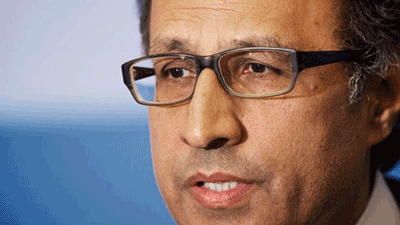Back to the Future?
By K. K. Shahid | Newsbeat National | Published 6 years ago

With Asad Umar’s departure, Imran Khan’s ‘dream team’ seems to have started unravelling.
Asad Umar was asked to step down as Pakistan’s Finance Minister on April 18, following his return from Washington, where he spearheaded Pakistan’s negotiations with the International Monetary Fund (IMF), for the country’s 13th bailout package. In lieu of that post, Prime Minister Imran Khan asked the former finance minister to take over the petroleum ministry as part of his cabinet reshuffle. Umar, however, declined.
Given that economic uplift, based on an accountability-driven revamp, was at the core of the ruling Pakistan Tehrik-e-Insaf (PTI)’s election manifesto, Asad Umar’s sacking is being interpreted as an admission of failure by the PM, with regard to the financial handling of the country’s teetering economy by a man who was long considered his star performer. Furthermore, the timing of the finance minister’s removal – with the country finalising the IMF bailout package, and the new budget about to be announced – has rung alarm bells among the masses.
The Pakistani rupee, which has been on a constant decline against the US dollar since December 2017, continued to trace new lows under the new government. The price of the rupee is hovering around the 142 mark against the US dollar – an over 35 per cent plunge in 18 months – which has further resulted in hikes in fuel prices and other commodities.
Meanwhile, the budget deficit rose to 4.2 per cent of the size of the national economy, amounting to Rs 1.6 trillion, during the eight months that Asad Umar was in charge of the finance ministry. In this time, the gaping disparity between expenses and revenue grew to 75 per cent of the annual target of 5.6 per cent of the GDP. A report released by the IMF, which is finalising the package for Pakistan, predicts the budget deficit will reach Rs 2.8 trillion – or 7.2 per cent of the GDP – within the current fiscal year.
In his first speech in the National Assembly since stepping down from the Finance Ministry, Asad Umar conceded that the incumbent government has failed to enhance revenues, which remains the biggest concern for the economy. His critics also accuse Umar of dillydallying on the inevitability of the IMF bailout package, maintaining that three-quarters of a fiscal year was wasted on a decision that should have been taken by the government immediately after coming to power.
Asad Umar had since his rise in party ranks, become the emblem of the PTI’s financial ideology. His removal was seen as a marker signifying the ruling party’s departure from his ethos. But what has perhaps really sung its death knell is the choice of his successor.

Hafeez Sheikh, the newly appointed Finance Minister of Pakistan.
Abdul Hafeez Shaikh, who served as Pakistan’s Finance Minister from 2010 to 2013, during the Pakistan People’s Party (PPP) rule, will now serve as the Advisor on Finance to the Prime Minister, in what has become a cabinet dominated by specialassistants and advisors.
Opting for Shaikh as Umar’s replacement is a move that has been criticised by various quarters, including the PPP leadership. PPP Chairperson Bilawal Bhutto-Zardari mocked the government in an address in the National Assembly for going for “Zardari’s finance minister” after spending a decade touting that the PPP rule was the cause of Pakistan’s financial crisis. PTI leader Shireen Mazari’s tweets from 2013, where she accused Hafeez Shaikh of being a “US agent” encapsulates the ruling party’s past rhetoric vis-à-vis its predecessors.
Sources within the ruling party say Shaikh’s appointment is based on the IMF’s recommendation, and a major factor in Asad Umar’s tenure being cut short was due to his unsuccessful dealings with the Fund.
Another major failure attributed to Umar is his tax amnesty scheme, which his successor shot down as the first task in his new role. Shaikh has asked the Federal Board of Revenue (FBR) to simplify the scheme so as to allow a larger number of people to whiten their assets. However, the amnesty scheme will only be finalised once the terms for the IMF bailout are agreed on.

Financial analyst Farrukh Saleem sounds off on Hafeez Sheikh’s appointment.
Former Finance Minister Salman Shah doesn’t understand Hafeez Shaikh’s appointment, given his performance in the PPP’s tenure at the helm.
“Hafeez Shaikh was tasked to implement the IMF programme before the one under Ishaq Dar. And even though the [bailout] amount was quite high, the programme included a VAT tax, which was quite controversial and completely marginalised the country’s business community. The programme wasn’t successful and had to be discontinued by Hafeez Shaikh,” he says.
“If they had learnt anything from the past, they would have known that IMF programmes are very unpopular in Pakistan. They would have to see what conditionality is demanded, and whether or not it can be implemented in the country without destroying the economy,” adds Dar.
Financial analyst Farrukh Saleem, who briefly served as the incumbent government’s Advisor on Energy and Finance, maintained that the changes at the finance ministry are the government’s admission of failure.
“It’s an official acceptance that the government’s policies weren’t right. Now after this admission of failure what we find is that the PTI team is nowhere to be seen, and the party has said goodbye to the economic agenda that it wrote in its manifesto. The cabinet now is almost identical to the one that surrounded [former Prime Minister] Yusuf Raza Gillani,” he says.
Saleem expects prices to rise further in the aftermath of the change at the helm of the finance ministry. According to him, “Prices increase owing to two factors: cost push and demand pull. This government has printed Rs 350 billion worth of currency at the State Bank over the past eight months. When you print new notes, the value of the rupee decreases. This adds to the inflation, along with the cost push that is driven by an increase in power and fuel.”
However, Saleem believes Hafeez Shaikh has the ability to address Pakistan’s financial woes in the long-run, given his proven record of improving foreign direct investment.
He contends, “Hafeez Shaikh is a man of of good calibre and pedigree. He has represented the World Bank in around a dozen countries. He has a good track record in Pakistan, and successfully ran the Sindh Finance Ministry. As the privatisation minister, he brought around five to six billion dollars’ worth of investment, which was unprecedented.”


